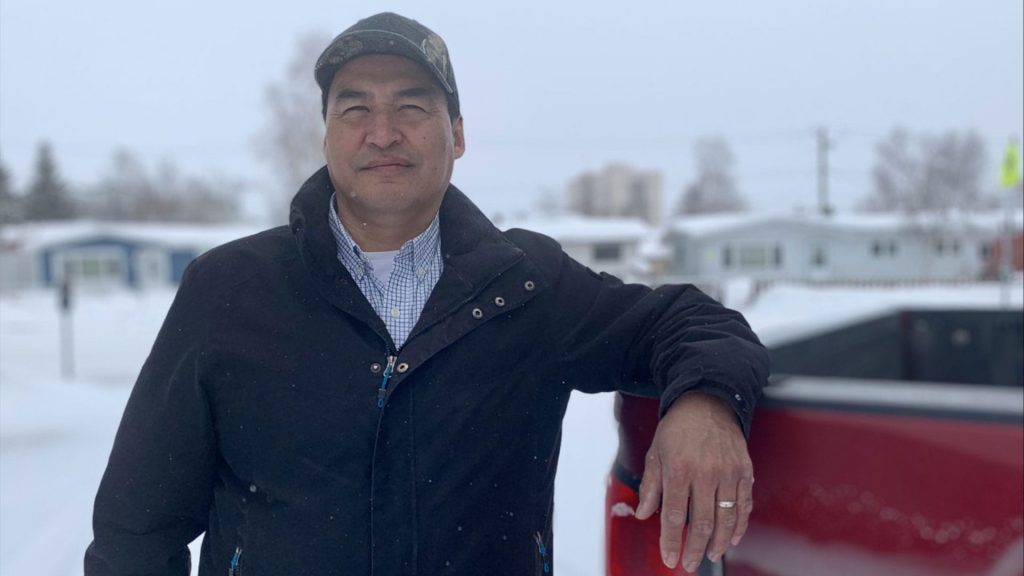
Floyd Bertrand, a member of Acho Dene Koe First Nation (ADKFN) challenged chief and council’s decision to postpone an election. Photo: Charlotte Morritt-Jacobs/APTN.
Canada has dropped its appeal of a Federal Court decision that ordered a First Nation in the Northwest Territories to hold a band election during the pandemic.
Floyd Bertrand, a member of Acho Dene Koe First Nation near Fort Liard, N.W.T., fought and won against his band in court after council used the federal First Nations Election Cancellation and Postponement Regulations (Prevention of Diseases) to defer its vote for a year.
“It’s good but it’s kind of unfortunate. We wanted our voices to be heard even more on other issues that we were challenging,” Bertrand told APTN News. “It just kind of solidifies and it just kind of confirms what we’ve been arguing all along.”
Indigenous Services Canada created the temporary regulations as a stopgap measure on April 8, 2020 to enable First Nations to cancel or postpone votes to prevent spread of COVID-19.
Many had raised concerns First Nations would be forced to hold elections amid spiking case counts and strict nationwide lockdowns, potentially resulting in outbreaks.
Read more:
Feds dig into the Indian Act to allow band councils to extend term during pandemic
Federal court orders First Nation in N.W.T. to hold election
But First Nations under custom election codes like Bertrand’s are self-governing in that respect. They follow their own legislation and not the Indian Act or the First Nations Elections Act, the two statutes the regulations rely on. Section 4 of the regulations nevertheless authorize these First Nations to extend their own term — even if their custom code doesn’t allow for it.
Bertrand argued Ottawa overstepped its authority by empowering his First Nation to override its own customary law that doesn’t allow for election postponement. Federal Court Justice Sébastien Grammond concurred, ordering the election resumed and deeming Section 4 invalid in an April 8 decision.
“I agree with Mr. Bertrand,” Grammond said. “The federal regulations are invalid, because they are not authorized by the Indian Act.”
Ottawa appealed the ruling, however, and promised to pass legislation that would retroactively legitimize any decisions made under the regulations. The government delivered on this pledge on June 29 when the Budget Implementation Act received royal assent.
In the act, a line that received little scrutiny in Parliament says the regulations “are deemed to have been validly made” along with all decisions made under them.
Bertrand hoped to strike this clause down as well during the appeal.
His lawyer Orlagh O’Kelly said in written arguments the move was a “conspicuous affront to the rule of law” that illegally violates the sovereignty of self-governing First Nations. Custom election codes are like constitutions that can only be modified through broad band member consensus, she argued.
“No amount of interpretative acrobatics or declaratory legislation can create federal government jurisdiction where none exists,” O’Kelly wrote in a July 15 filing.
Bertrand filed a constitutional challenge against the clause on July 19.
Then on July 21 the Justice Department filed a notice of discontinuance, abruptly ending the appeal.
“The timing of the discontinuance was interesting,” O’Kelly said in an interview. “The sub-message, to me, was that they believed we had the stronger case.”
ISC responds
Indigenous Services Canada said in an email however that it ended the appeal because it believes the budget legislation resolved the “core issue” of whether or not the regulations are valid.
Spokesperson Leslie Michelson said the regulations have been twice extended and will expire on October 8 so First Nations can postpone or cancel elections to avoid governance gaps as the pandemic continues.
“The Department continues to monitor the pandemic situation and work with First Nations to ensure the health and safety of communities.”
Meanwhile the Bertrand decision has already set a precedent for others. Vernetta Campeau, a member of Muskowekwan First Nation in Saskatchewan, sought judicial review after council used the regulations to override its custom code and cancel an election that was already underway.
Campeau won an injunction on June 21 ordering Muskowekwan to resume the vote. It was a notable victory because, as the judge explained, securing the injunction was tantamount to winning the case.
“I was so happy because I felt justice was served,” said Campeau in an interview. “That was taken away from us. That election was ripped away from us — and that took our voice away.”
She said there were two people running for council in the first election that didn’t make it onto the ballot once a new one began. When the original election resumed, their names returned to the ballot and, once the votes were tabulated, they won.
“I feel that what I did was meant to be because these councillors would not have made it to the table had I not stepped up and challenged this decision,” said Campeau.
Legal group helps members keep bands honest
Campeau and Bertrand both had help from the Band Members Alliance and Advocacy Association of Canada, or BMAAAC.
Registered in 2019, the relatively new not-for-profit national organization is becoming somewhere members can turn to hold their First Nations accountable for allegedly corrupt, nepotistic or otherwise inappropriate behaviour.
BMAAAC’s stated mission is to increase access to justice for regular First Nations citizens and lists 16 cases, many of which are about elections, on its website.
President Rob Louie told APTN his organization intervened in the Bertrand case because it raised important legal questions about the extent of Ottawa’s powers over band elections and the rights of members to scrutinize, review and challenge those votes.

He said the organization is in meetings with First Nations contemplating filing a new legal challenge against the clause in the budget act that validates the government’s regulations in federal law. He disagrees with Ottawa about the “core issue” being settled.
“This is a case I think that needs to be decided by the courts,” said Louie. “It doesn’t sit well that the federal government can magically create special laws for a chief to stay in office longer than they should be.”
Of the cases listed on its website, Louie said the organization hasn’t lost one. He said about 40 per cent of the calls he gets are about electoral corruption. Forty per cent are about band finances. The other 20 per cent are what he calls “miscellaneous” issues — random acts of allegedly bad behaviour.
Both Bertrand and Campeau were grateful for BMAAAC’s advocacy. Louie spoke with APTN alongside the latest litigant to get help from the organization.
Kathy Masuskapoe is taking her band, Ahtakakoop Cree Nation, to court. She filed an appeal in Federal Court on July 19 seeking a do-over of the nation’s June election.
“Having BMAAC there is a major support because we have that legal support behind us, knowing what our rights are, what we can do and what’s the best decision to make to get our voices heard,” she said.
“We have the right to speak up and feel like we have that trust between leadership and band members.”










